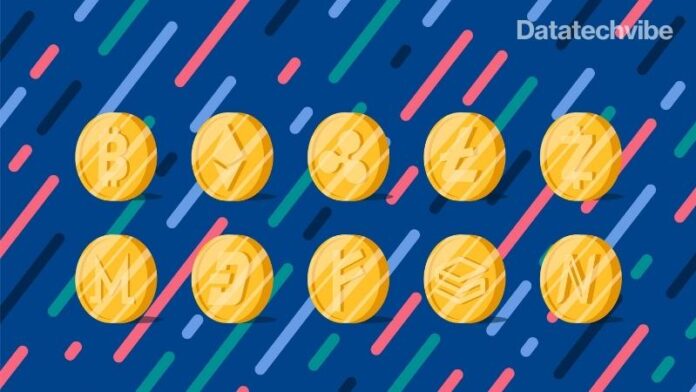Cryptocurrency isn’t just limited to Bitcoin or Ethereum, there are over 6,700 cryptocurrencies traded globally. The global crypto market is expected to be valued at $1,758 million by 2027, growing at a CAGR of 11.2 per cent. We take a look at the Top 10 cryptocurrencies. Cryptocurrencies are valued based on their longevity — how long it has been in existence, it’s track record and business performance.
Bitcoin (BTC)
The oldest and the most widely known cryptocurrency, representing almost 40 per cent of the crypto market cap. With a market capitalisation worth $1.2 trillion, Bitcoin is the leading cryptocurrency in the world. Many businesses accept Bitcoin as payments. Tesla allows customers to purchase cars with Bitcoin.
Ethereum (ETH)
A decentralised software enables smart contracts and decentralised apps to run without any downtime, fraud, or third-party control. Ethereum, also known as Ether, was created by Vitalik Buterin, a Russian-born programmer living in Canada. Ether’s market cap is 19 per cent of Bitcoin’s size, has a market capitalisation worth $263.4 billion
Binance Coin (BNB)
A utility cryptocurrency, a Binance coin is used to facilitate payments while trading in a Binance Exchange known as an exchange coin. Binance coin has a market capitalisation worth $87 billion. In March, the Commodity Futures Trading Commission investigated the cryptocurrency exchange over concerns that it allowed Americans to place wagers that violated US rules. Binance co-founder Changpeng Zhao said that the company closely follows American rules and has strong controls to prevent its customers from laundering funds.
Ripple (XRP)
Ripple is both a currency as well as an exchange. Ripple allows fast and cheaper transactions as compared to Bitcoin. With a market capitalisation worth $81.8 billion, Ripple is known as the joker card in the crypto market. The card allows itself to proxy or represents any other card. Ripple was created by Jed McCaleb in 2013.
Tether (USDT)
Tether crypto coins are backed by an equivalent amount of traditional fiat currencies, like the dollar, the euro, or the yen, which are held in a designated bank account. With a market capitalisation worth $45.4 billion, Tether aims to keep cryptocurrency valuations stable, as opposed to the wide swings observed in the prices of other popular cryptocurrencies like Bitcoin and Ethereum.
Cardano (ADA)
Launched in 2017, Cardano has positioned itself as an alternative to Ethereum. Both platforms are used for similar applications, such as smart contracts, and have goals of building a connected and decentralised system. With a market capitalisation worth $44.7 billion, Cardano considers itself as an updated version of Ethereum.
Polkadot (DOT)
Polkadot was founded by the Web3 Foundation in Switzerland and is an open-sourced, decentralised web created by ex-Ethereum CTO Gavin Wood, Robert Habermeier and Peter Czaban. Polkadot serves as a protocol for protocols or a blockchain for blockchains. Introduced in 2020,d with a market capitalisation of $39.3 billion, Polkadot aims to reward genuine investors and remove those who are trading to make quick money.
Uniswap (UNI)
Inspired by Ethereum founder Vitalik Buterin, Uniswap was created by Hayden Adams. Uniswap uses a pricing mechanism called Constant Product Market Maker Model that differentiates it from other apps. Uniswap has a market capitalisation worth $18.8 billion. Uniswap allows the swapping of ERC20 tokens as it is an Ethereum-based decentralised exchange.
Litecoin (LTC)
Litecoin was created by Charlie Lee, an MIT graduate and former Google engineer, in 2011. Litecoin is based on an open-source global payment network that is not controlled by any central authority and uses scrypt as a proof of work, which can be decoded with the help of CPUs of consumer-grade. Similar to Bitcoin in many ways, Litecoin has a faster block generation rate and hence offers a faster transaction confirmation time. Litecoin has a market capitalisation worth $18.1 billion.
Stellar (XLM)
Stellar was founded by Jed McCaleb, a founding member of Ripple Labs and developer of the Ripple protocol.. Stellar have a market capitalisation of $6.1 billion. Transactions between banks and investment firms that typically would take a long time and cost more money with multiple intermediaries can be done on stellar superfast and costs less money.









